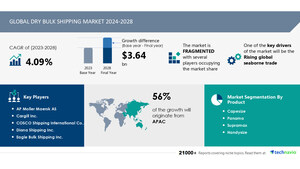NEW YORK, Oct. 28, 2024 /PRNewswire/ -- Report on how AI is redefining market landscape- The global stable isotope labeled biomolecules market size is estimated to grow by USD 92.1 million from 2024-2028, according to Technavio. The market is estimated to grow at a CAGR of 5.6% during the forecast period. Expansion of environmental and ecological research is driving market growth, with a trend towards drug discovery and development. However, high costs of stable isotopes poses a challenge. Key market players include BOCSCI Inc., Cambridge Isotope Laboratories Inc, Entegris Inc., Icon Labeling Inc, ISOFLEX USA, Isolife BV, LGC Ltd, Medical Isotopes Inc, Oak Ridge National Laboratory, Omicron Biochemicals Inc, SAS Alsachim, Sigma Aldrich Chemicals Pvt Ltd, Silantes GmbH, Symeres, Triad National Security LLC, Urenco Ltd., and WITEGA Laboratorien Berlin-Adlershof GmbH.
AI-Powered Market Evolution Insights. Our comprehensive market report ready with the latest trends, growth opportunities, and strategic analysis- View your snapshot now
Forecast period |
2024-2028 |
Base Year |
2023 |
Historic Data |
2018 - 2022 |
Segment Covered |
Type (D labeled biomolecules, 15N labeled biomolecules, and 13C labeled biomolecules), End-user (Scientific research and Medical), and Geography (North America, Europe, Asia, and Rest of World (ROW)) |
Region Covered |
North America, Europe, Asia, and Rest of World (ROW) |
Key companies profiled |
BOCSCI Inc., Cambridge Isotope Laboratories Inc, Entegris Inc., Icon Labeling Inc, ISOFLEX USA, Isolife BV, LGC Ltd, Medical Isotopes Inc, Oak Ridge National Laboratory, Omicron Biochemicals Inc, SAS Alsachim, Sigma Aldrich Chemicals Pvt Ltd, Silantes GmbH, Symeres, Triad National Security LLC, Urenco Ltd., and WITEGA Laboratorien Berlin-Adlershof GmbH |
Key Market Trends Fueling Growth
The stable isotope labeled biomolecules market is experiencing notable progress, primarily in the drug discovery and development sector. Iron, an essential element for human health, is frequently deficient, leading to widespread disability. Stable (non-radioactive) iron isotope techniques have become indispensable for assessing iron kinetics from oral supplements and fortificants, as well as for investigating the effects of diseases and genetic disorders on iron absorption and excretion. The rapid detection of stable iron isotopes in plasma following oral administration enables the swift evaluation of iron absorption rates, quantities, and patterns. Furthermore, the erythrocyte iron incorporation method, which measures both absorption and subsequent utilization by erythrocytes 14 days post-administration, offers comprehensive insights into iron metabolism. The iron isotope dilution method, employing naturally occurring iron as a tracer, facilitates long-term studies of iron absorption, loss, and gain, providing a detailed understanding of iron homeostasis at the cellular and molecular levels. Advancements in single-cell isotopic techniques are revolutionizing the field by enabling precise determination of isotope abundances at a granular spatial level. When combined with -omics data, these techniques bridge the gap between single-cell activity and tissue- or organism-level responses, offering new insights into biological processes. This innovation is particularly significant in drug discovery, where understanding the intricate details of cellular mechanisms is crucial. Strategic collaborations are also driving growth in the stable isotope labeled biomolecules market. For instance, in January 2024, Paris-based Aqemia partnered with Sanofi to discover small molecules across multiple therapeutic areas, with a potential deal value of up to USD140 million. Similarly, Argent BioPharma Limited secured USD500,000 in funding in July 2024, underscoring the increasing investment in innovative drug discovery approaches within the biopharmaceutical sector. These trends suggest and dynamic future for the global stable isotope labeled biomolecules market, fueled by technological advancements and strategic partnerships, which will continue to drive market growth during the forecast period.
The Stable Isotope Labeled Biomolecules market is witnessing significant growth due to the increasing demand for isotopic labeling in scientific research, medical, and industrial applications. Isotopes like Carbon-13, Nitrogen-15, Oxygen-18, and Deuterium are widely used for radiolabeling and isotopic labeling of proteins, lipids, nucleic acids, metabolites, and other biomolecules. This helps in understanding metabolic pathways, protein interactions, drug metabolism, and molecular pathways. The market is driven by trends in carbon neutrality, metabolomics, proteomics, drug discovery, and personalized medicine. High-throughput analyses, miniaturized labeling systems, and automated microfluidic platforms are key technologies driving market growth. Applications include structural biology, drug development, diagnostics, chronic diseases, research tools, mass spectrometry, and medical imaging. The biotech sector is a major consumer, with a focus on biomarkers and precision diagnostics.
Insights on how AI is driving innovation, efficiency, and market growth- Request Sample!
Market Challenges
- The stable isotope labeled biomolecules market is currently experiencing a significant challenge due to the increasing prices of stable isotopes, such as 13C and 2H (deuterium). These isotopes, which have slightly different properties than their natural counterparts, are essential in various scientific disciplines, including NMR spectroscopy and quantitative mass spectrometry. They are extensively used in studies ranging from environmental research to disease diagnostics. Over the past year, the market for stable isotope labeled chemicals has seen a dramatic price increase of over 200%. This trend is particularly evident in the prices of fundamental stable isotope labeled chemicals, such as 13CO2 and D2O, which began to rise in the first half of 2022. The costs of stable isotope labeled biomolecules, such as glucose and amino acids, which are essential components of cell culture media, have also escalated significantly. Several factors contribute to this price hike. Geopolitical developments and shifts in consumer market behavior have disrupted the supply and demand balance. While the demand for stable isotopes is rising sharply, the supply capacities are simultaneously declining. This imbalance has led to substantial price increases, posing a considerable challenge for researchers and industries that rely on these materials. The elevated prices can limit the accessibility and affordability of stable isotopes, potentially hindering scientific progress and innovation. Researchers may face budget constraints, leading to reduced scope or scale of their studies. Industries that depend on stable isotopes for product development and quality control may also experience increased production costs, negatively affecting their overall competitiveness. These factors may hamper the growth of the stable isotope labeled biomolecules market during the forecast period.
- The Stable Isotope Labeled Biomolecules market is witnessing significant growth due to the increasing demand for isotope-labeled biomolecules in various applications. Nitrogen-15, Oxygen-18, and Deuterium are commonly used isotopes for labeling proteins, lipids, nucleic acids, metabolites, and other biomolecules. These labeled biomolecules play a crucial role in structural biology, metabolomics, proteomics, drug discovery, and metabolic processes. They help in understanding molecular pathways, protein interactions, drug metabolism, and drug development. The biotech sector is the major consumer of stable isotope labeled biomolecules due to their use as research tools in biomedical research, diagnostics, and personalized medicine. The challenges in this market include the high cost of labeling systems, the need for high-throughput analyses, and the development of miniaturized labeling systems and automated microfluidic platforms. The market also caters to various industries, including healthcare, environmental testing, water analysis, soil analysis, and clean energy sources. The applications of stable isotope labeled biomolecules extend to cancer diagnosis, early detection, metabolism tracking, custom synthesis, lipidomics, and more. Mass spectrometry is the primary technology used for the detection and analysis of these labeled biomolecules. Overall, the Stable Isotope Labeled Biomolecules market is expected to grow significantly due to the increasing demand for these labeled biomolecules in various industries and applications.
Insights into how AI is reshaping industries and driving growth- Download a Sample Report
Segment Overview
This stable isotope labeled biomolecules market report extensively covers market segmentation by
- Type
- 1.1 D labeled biomolecules
- 1.2 15N labeled biomolecules
- 1.3 13C labeled biomolecules
- End-user
- 2.1 Scientific research
- 2.2 Medical
- Geography
- 3.1 North America
- 3.2 Europe
- 3.3 Asia
- 3.4 Rest of World (ROW)
1.1 D labeled biomolecules- The stable isotope labeled biomolecules market is experiencing notable expansion, with the D labeled biomolecules segment showing notable growth. Deuterium (D) is increasingly used in various industries, such as pharmaceuticals and semiconductor manufacturing, due to its unique properties. In pharmaceuticals, D labeled biomolecules are gaining popularity as they enhance the metabolic stability and bioavailability of small molecules, making them more effective therapeutic agents. This trend is driving the demand for D labeled biomolecules in drug synthesis, as researchers and developers aim to create more efficient and long-lasting medicines. The technological advancements in precision deuteration techniques and ongoing research and development efforts are expected to uncover new applications for D labeled biomolecules, further fueling market growth. Overall, the D labeled biomolecules segment is projected to witness expansion, underpinned by the increasing demand across industries and the benefits of deuterium incorporation.
Download complimentary Sample Report to gain insights into AI's impact on market dynamics, emerging trends, and future opportunities- including forecast (2024-2028) and historic data (2018 - 2022)
Research Analysis
Stable isotope labeled biomolecules refer to biomolecules, such as proteins, lipids, nucleic acids, metabolites, and others, that have been labeled with stable isotopes, including Carbon-13, Nitrogen-15, Oxygen-18, and Deuterium. Isotopic labeling is a powerful tool used in scientific research and the life sciences industry for various applications, including metabolic pathway analysis, radiolabeling, carbon neutrality studies, and medical imaging. Stable isotopes are atoms of an element with a stable nuclear configuration, making them non-radioactive and safe for use in research and medical applications. The use of stable isotope labeled biomolecules enables researchers to trace metabolic pathways, study metabolism, and structure-function relationships, and even aid in early cancer detection and medical imaging. Custom synthesis of 15N labeled biomolecules and 13C labeled biomolecules is a growing area of interest due to their applications in lipidomics, structural biology, and metabolomics.
Market Research Overview
Stable isotope labeled biomolecules refer to biological molecules, such as proteins, lipids, nucleic acids, metabolites, and other biomolecules, that have been labeled with stable isotopes, including Carbon-13, Nitrogen-15, Oxygen-18, and Deuterium. These labels enable researchers to trace metabolic pathways, study protein interactions, and investigate molecular pathways in various fields, including scientific research, medical, and industrial applications. Isotopic labeling techniques, such as radiolabeling and mass spectrometry, provide valuable insights into metabolic processes, drug discovery, and metabolomics, proteomics, and drug development. The use of stable isotope labeled biomolecules in biotech sector, diagnostics, and personalized medicine facilitates early detection, precision diagnostics, high-throughput analyses, and custom synthesis. Miniaturized labeling systems and automated microfluidic platforms enable efficient and cost-effective production of stable isotope labeled biomolecules for various applications, including metabolism tracking, biomedical research, drug metabolism, medical imaging, cancer diagnosis, environmental testing, water analysis, and soil analysis. Stable isotopes play a crucial role in carbon neutrality initiatives, as they enable the production of carbon-neutral fuels and clean energy sources.
Table of Contents:
1 Executive Summary
2 Market Landscape
3 Market Sizing
4 Historic Market Size
5 Five Forces Analysis
6 Market Segmentation
- Type
- D Labeled Biomolecules
- 15N Labeled Biomolecules
- 13C Labeled Biomolecules
- End-user
- Scientific Research
- Medical
- Geography
- North America
- Europe
- Asia
- Rest Of World (ROW)
7 Customer Landscape
8 Geographic Landscape
9 Drivers, Challenges, and Trends
10 Company Landscape
11 Company Analysis
12 Appendix
About Technavio
Technavio is a leading global technology research and advisory company. Their research and analysis focuses on emerging market trends and provides actionable insights to help businesses identify market opportunities and develop effective strategies to optimize their market positions.
With over 500 specialized analysts, Technavio's report library consists of more than 17,000 reports and counting, covering 800 technologies, spanning across 50 countries. Their client base consists of enterprises of all sizes, including more than 100 Fortune 500 companies. This growing client base relies on Technavio's comprehensive coverage, extensive research, and actionable market insights to identify opportunities in existing and potential markets and assess their competitive positions within changing market scenarios.
Contacts
Technavio Research
Jesse Maida
Media & Marketing Executive
US: +1 844 364 1100
UK: +44 203 893 3200
Email: [email protected]
Website: www.technavio.com/
SOURCE Technavio

WANT YOUR COMPANY'S NEWS FEATURED ON PRNEWSWIRE.COM?
Newsrooms &
Influencers
Digital Media
Outlets
Journalists
Opted In





Share this article